ACKNOWLEDGMENTS
This book would not have been possible without the support of many teachers, colleagues, friends, and family. It began as a PhD dissertation in the Department of Classics at the University of California, Berkeley, co-directed by Mark Griffith and Leslie Kurke. I owe a huge amount to that vibrant community, where I learned so much.
When I first arrived at UC Berkeley as a graduate student, I did not yet know that my interests in Greek drama would take a musical turn. It was thanks to Mark Griffith that I began to think of tragedy in terms of performance rather than just text, and it was as a result of his seminar on the Electra plays in 2009 that I became excited about the various musical images at play in Euripides work. Mark has been incredibly generous and supportive ever since, and his extensive feedback on every part of this project has left me astonished at the depth and range of his knowledge and intellectual curiosity.
I also owe special thanks to Leslie Kurke, who has shaped how I read and think in fundamental ways. Every conversation with her has significantly improved this book and my scholarship more generally. She has been an extraordinary teacher, critic, and friend.
I have been very fortunate in my other mentors as well. As time goes by, my debt to Donald Mastronarde grows ever greater. His teaching and meticulous reading of my work has made me a better scholar. Anastasia-Erasmia Peponi allowed me to join her seminars on Greek mousik and aesthetics at Stanford University, which made me think much more deeply about the musical imaginary and its relationship to live performance. Her comments on my work, both encouraging and critical, have helped me to articulate the aims and focus of this project. I gained much from the musicologist Richard Crocker, who over tea and biscuits repeatedly opened my ears to the musical notes and narratives of Greek texts. I wish Albert Henrichs could still be here for me to tell him quite how grateful I am for his inspiration and support.
It is a pleasure to thank here some of the other friends and colleagues who have helped me at various stages in this books life. Armand DAngour, who was once my teacher at Oxford, has continued to give vital feedback on my work over the years. Sarah Olsen has been a wonderful reader and friend, able to discuss choreia and babies at the same time. Zoa Alonso Fernndez, Lauren Curtis, and Sarah McCallum have helped me produce a book out of the dissertation and been lovely companions along the way. Sen Curran has been a constant source of inspiration. My colleagues in the Department of the Classics at Harvard have provided much encouragement and advice. Pauline LeVen, Sheila Murnaghan, Tim Power, and Deborah Steiner have been helpful interlocutors. Eric Csapo and Peter Wilson made it possible for me to visit them in Sydney and provided much intellectual stimulation while I was there. I have benefited from comments on various chapter drafts from Jared Hudson, David Jacobson, Rachel Lesser, Virginia Lewis, Katharina Piechocki, Nicholas Watson, and Leah Whittington. Thanks also to Nadav Asraf, Paul Johnston, and Suzanne Paszkowski for their careful proofreading and help with the bibliography, and to Roberta Engleman for preparing the index.
I am very grateful to my editor at UC Press, Eric Schmidt, for his support, advocacy, and unfailingly sensible advice. Maeve Cornell-Taylor fielded my various questions with patience and kindness. Cindy Fulton, the project editor, has carefully steered the book toward publication. Paul Psoinos has been an exemplary copyeditor, painstakingly dealing with the various mistakes of a first-time author. The thoughtful and constructive reports of the three anonymous readers, as well as that of the Editorial Committee, have much improved the manuscript.
Finally, I give heartfelt thanks to my family. Isobel was born as I was finishing the dissertation; Oliver arrived as it was nearing completion as a book. Life with them is a tiring but very happy one, and they keep me sane and grounded within my world of Greek mousik. Sam has stood by me every step of the way, from Oxford to Berkeley to Harvard, and kept me afloat with his unwavering love and support. It is difficult to express quite how grateful I am to my parents, Nigel and Judy Weiss, for educating me, valuing my work, and always asking interesting questions. I dedicate this book to them.
ABBREVIATIONS
Abbreviations of authors and works follow the Oxford Classical Dictionary, fourth edition, ed. S. Hornblower, A. Spawforth, and E. Eidinow (Oxford, 2012). Journal titles are abbreviated according to the conventions of LAnne Philologique. Additional abbreviations are listed below.
Dindorf | W. Dindorf, ed., Aristides, 3 vols. (Leipzig, 1829). |
FGrH | F. Jacoby, ed., Die Fragmente der griechischen Historiker (Leiden, 195469). |
KA | R. Kassel and C. Austin, eds., Poetae comici Graeci (Berlin and New York, 1983). |
LIMC | Lexicon iconographicum mythologiae classicae (Zurich, 198197). |
LSJ | H.G. Liddell, R. Scott, H. Stuart Jones, R. McKenzie, and P.G.W. Glare, eds., A Greek-English Lexicon, 9th ed., with supplement (Oxford, 1996). |
PMG | D.L. Page, ed., Poetae melici Graeci (Oxford, 1962). |
PMGF | M. Davies, ed., Poetarum melicorum Graecorum fragmenta, vol. 1 (Oxford, 1991). |

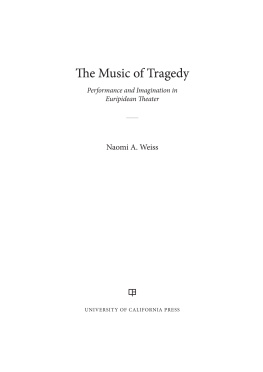
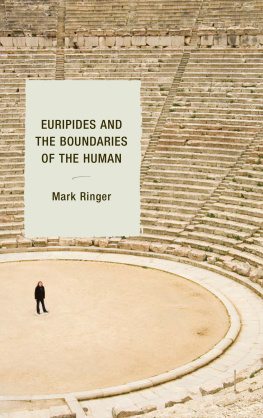

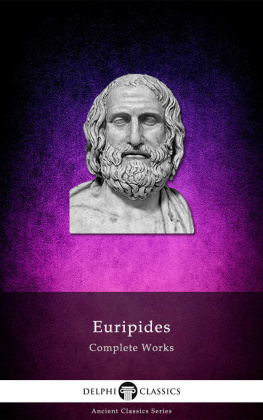
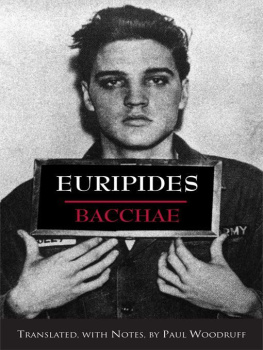
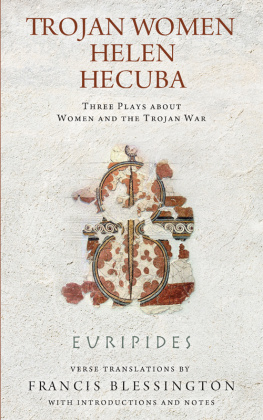

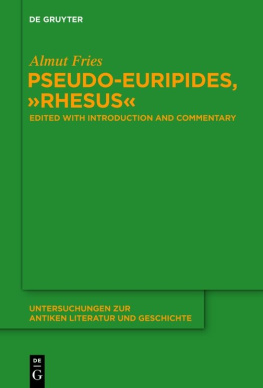
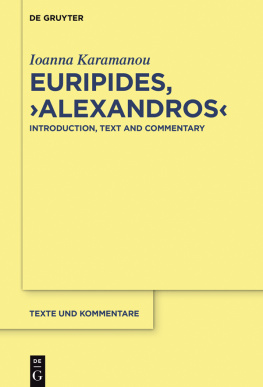
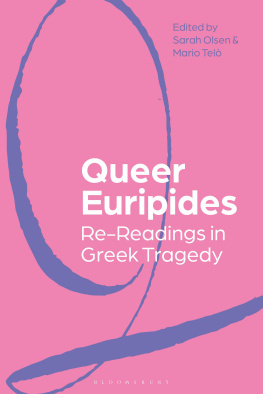
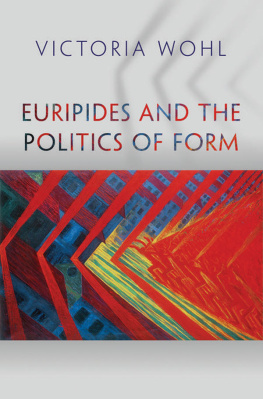
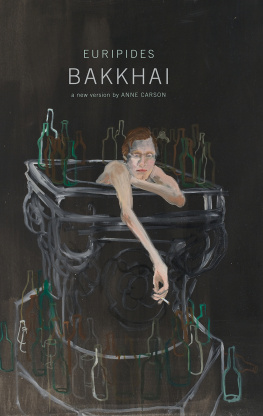
![Euripides - Classic Greek Drama: 10 Plays by Euripides in a Single File [NOOK Book]](/uploads/posts/book/43473/thumbs/euripides-classic-greek-drama-10-plays-by.jpg)


